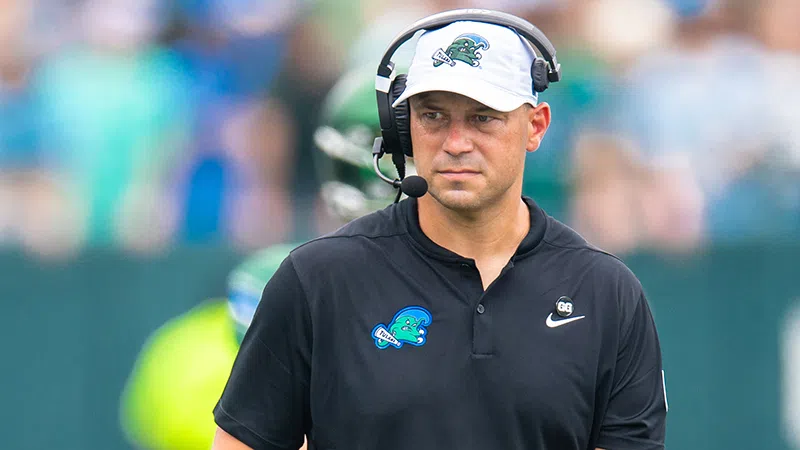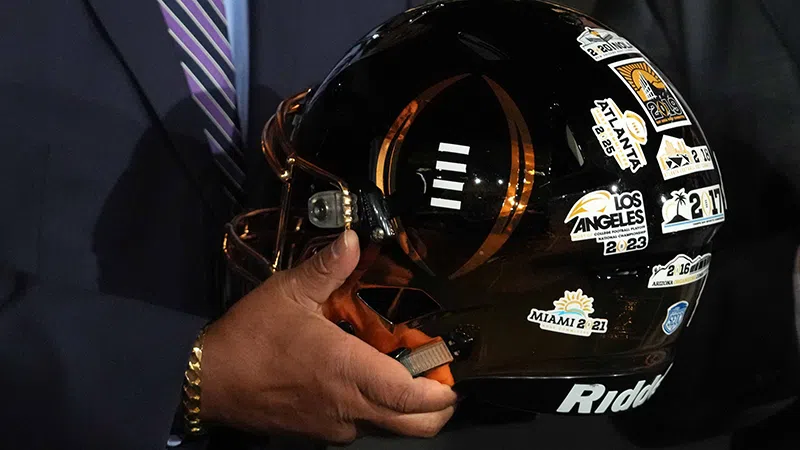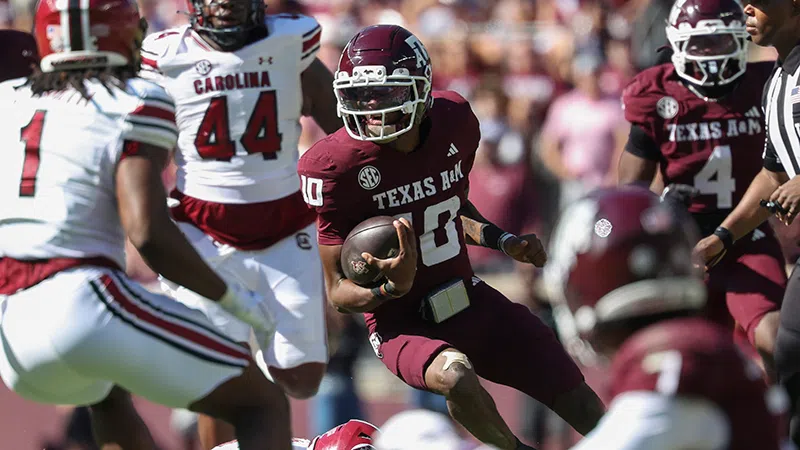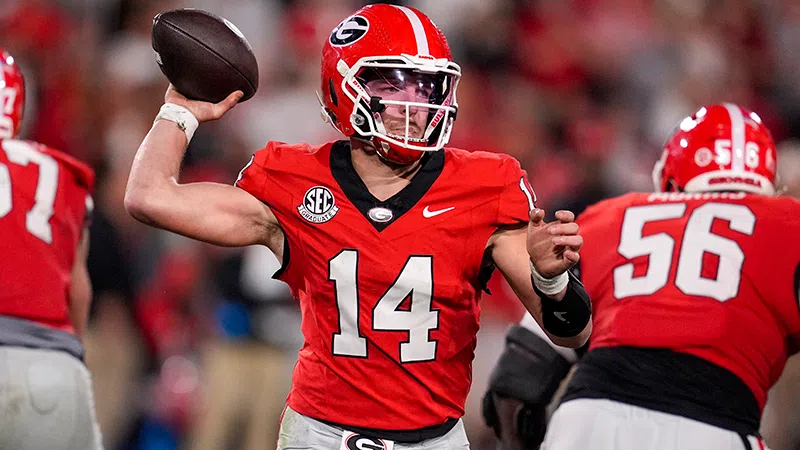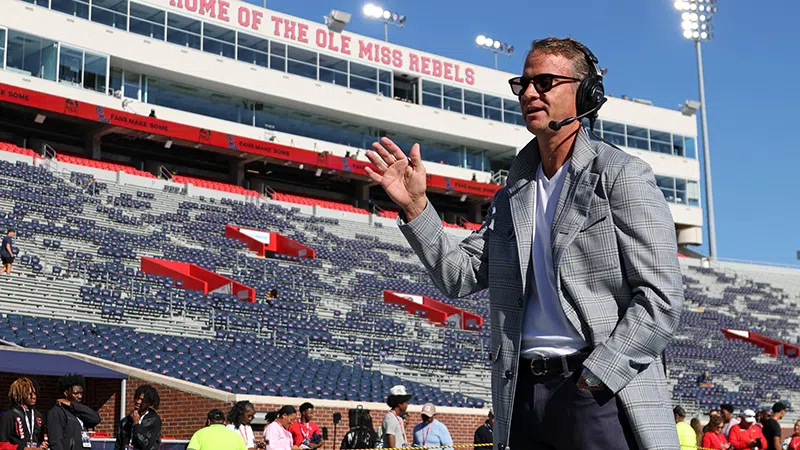
Nelson Chenault-Imagn Images
By Chris Marler
There are a lot of things that confuse me at 39 years old.
Square-foot math? No clue. The metric system? Absolutely not. Anything under the hood of a car? Immediate Google and YouTube search.
At least most of those things come with straightforward explanations.
But last night, listening to CFP committee chair and Arkansas AD Hunter Yurachek try to justify the new rankings, I was dumbfounded. We’re talking quantum physics or pretending to follow my fiancée’s work drama levels of confused.
Here are some of the highlights, in case you missed it.
-
Oregon (Ranked No. 7) is still getting credit for their win at 4–6 Penn State.
“They had a really big win at (6–4) Iowa two weeks ago. Iowa was ranked in our Top 25, previously. They won at Penn State. I know Penn State is not the same Penn State we expected them to be this year. Still, it’s a very challenging place to play…”
He later said Virginia didn’t climb the rankings after a 17-point win over Duke because Louisville lost and fell out of the Top 25, which he called one of Virginia’s best wins.
So beating a 7–3 Louisville team that just lost to Clemson doesn’t help a 9–2 team at all, but beating a 4–6 preseason darling somehow does? Got it.
CFP chair Hunter Yurachek says that Oregon is still getting credit for beating Penn State even though the Nittany Lions fell off after that game.
— Nicole Auerbach (@NicoleAuerbach) November 19, 2025
-
The Ducks are also ranked highest in the No. 7 to No. 10 grouping of teams because they have the best stats. No, really, he said that.
“We had significant discussion of the teams 7–10 comparing Oregon, Oklahoma, Notre Dame and Alabama. Oregon, while their strength of schedule might not be as strong as Oklahoma, they rank in the Top 10 in several of the statistical categories we use.”
Remember this summer when we were promised that strength of schedule would actually matter in this year’s metrics? That came after many fans were already upset that 11–2 SMU earned an at-large bid despite having no ranked wins and entering December with the No. 75 strength of schedule in FBS.
Guess what? They lied.
Here is what CFP chair Hunter Yurachek said about Oregon’s resume: pic.twitter.com/9knq7uMRBr
— Nicole Auerbach (@NicoleAuerbach) November 19, 2025
If you are grouping those four teams like Yurachek said, why not include strength of schedule? Or, at the very least, include Top 25 wins? Because it would make too much sense, that’s why.
Strength of Schedule Rankings
- No. 7 Oregon – 31st
- No. 8 Oklahoma – 10th
- No. 9 Notre Dame – 29th
- No. 10 Alabama – 4th
Number of Ranked Wins
- No. 7 Oregon – 0
- No. 8 Oklahoma – 2
- No. 9 Notre Dame – 1
- No. 10 Alabama – 4
-
For Alabama, losing to a 5–5 Florida State team is bad enough, but now, for the first time in 12 years, their rushing struggles are somehow the committee’s defining metric.
“Florida State was up in that game 24–7 and they held Alabama to less than 100 yards rushing in that. Really, that was a sign of some of the struggles Alabama was going to have rushing the ball. You go back and look at Alabama’s game at South Carolina where they scored two touchdowns late to win that game. The next game, against LSU, where they won both of those but didn’t rush the ball for 100 yards. Again, against Oklahoma, was not able to move the ball on the ground.”
There is no denying Alabama’s inability to run the football. I guess my biggest question is when did that become a metric that was prioritized for evaluating teams? In the 12 years of the CFP, I have heard ranked wins, bad losses, good losses, strength of schedule, strength of record and game control all used as metrics and data points to evaluate teams in this ranking.
I have never heard anyone look at Rece Davis with a straight face on the Tuesday night broadcast and say, “Sure, they’re 4–1 against the teams in our own rankings, but did you see how bad they are at rushing the ball?”
Yurachek, continued on Alabama: “You go back and look at Alabama’s game at South Carolina where they scored two touchdowns late to win that game. The next game against LSU where they won both of those but didn’t rush the ball for 100 yards. Again, against Oklahoma, was not able… https://t.co/0fZNtG4T8U
— Mike Rodak (@mikerodak) November 19, 2025
It’s fair to hold that FSU loss over their head. It was a bad loss to a bad team. Where the confusion and contradiction sets in is that they won eight games in a row after that. They also won four straight against teams currently ranked in the Top 25, and did so in four straight weeks. They’re the only team in the 90+ year history of the SEC to achieve that. But, man, those rushing yards.
Bama has gone 4-1 against the CFP committee’s Top 25
They have as many wins against the CFP Top 25 than Indiana, Oregon and Ohio State do COMBINED
That a bad loss to FSU suddenly means more than having the best win of any CFP Top 25 team means the committee has lost the plot https://t.co/8PHmF1QY4e
— Graham Coffey (@GrahamCoffeyDC) November 19, 2025
-
Quality losses matter, but not as much as brands.
“I think when you look at Notre Dame and Miami, we really compare the losses of those two teams. Miami has lost to two unranked teams. We really haven’t compared those two teams, they haven’t been in similar comparative pools to date. But Miami is creeping up to where they will be compared to Notre Dame. If something happens above them.”
Buddy, if you think comparing their losses is the way to rank these two, wait until I tell you one of them literally lost to the other this season.
Miami was ranked at No. 13 and Notre Dame was ranked at No. 9, which to be honest I didn’t have a huge issue with. The real question is why the Hurricanes are ranked noticeably higher than two fellow ACC teams when they’re basically eliminated from the title hunt. The answer is, most likely, so they can get ahead of any potential chaos and have a reason to plug them, a blue blood, into an at-large bid despite two losses to unranked teams.
But what about their resumé compared to a 9–1 BYU, who is currently behind three two-loss teams?
“I mean, Utah, they’ve lost two games this season, one to No. 5 Texas Tech, the other to No. 11 BYU. Comparatively, Miami’s lost two games, one at home to an unranked Louisville and one on the road against an unranked SMU. I think the differentiator is the losses that Utah has versus the losses that Miami has.”
And now we’ve come full circle. Once again, as viewers and fans, we’re right back where we are every year, listening to a committee created to replace computers only to hear one person speak for 12 others and admit, basically, that they’re making it up as they go.
To quote The Who, “Meet the new boss. Same as the old boss.”
I guess the one refreshing change is that maybe we can stop pretending the rankings are full of SEC bias. What they are full of isn’t something I’m allowed to type out.

More SEC News
